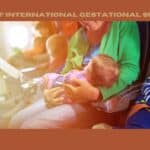I have to confess, I hadn’t heard of Sofia Vergara or her ex-fiance, Nick Loeb, until the frozen embryo custody battle broke in the news.
For those, like me, who aren’t familiar with these two, Vergara is an actress, mostly known for her role in the TV show Modern Family, and Loeb is a businessman who has worked in republican politics, supporting candidates and running unsuccessfully for local office in Florida.
I came to take notice of these two after reading that they had created frozen embryos using Vergara’s eggs and Loeb’s sperm to use later when they decided to start their family. Apparently, the contract they signed only stipulated what would become of their embryos if they died. Nothing was explicit in the contract addressing the disposition or ownership of the embryos if they broke up their relationship.
That is of course what happened: they broke up and now they are in a custody battle for the embryos. Vergara wants the embryos destroyed, but Loeb issued a statement saying, “I have always strongly believed that life begins at conception and that every embryo is a life on the journey towards birth. I created these two female embryos with the purpose of taking them to term and not destruction, because I have always dreamed of being a father.” He even upped the ante in his statement absolving Vergara of “any parental or financial responsibilities or obligations” and allowing her to be involved with the children “should she change her mind.”
Is the frozen human embryo person or property? Currently, the law in the U.S. sees the human embryo as property. When we talk about “embryo adoption” there is no formal adoption taking place because the embryo is property. What happens in reality with embryo adoption is the transfer of property from one to another. In this case, the property is a surplus embryo.
Another wrinkle in this case is that the embryos are not in Vergara’s body, so while U.S. law is biased toward a woman having autonomy over her body—her body, her choice—this isn’t the case here because the embryos in dispute are frozen in a lab.
We at the CBC will be following this case closely, but we predict that whatever decision is reached, the decision will be based on the view that the embryo is property and not person.
Image credit: Sofía Vergara May 2014 (cropped)” by Yahoo from Sunnyvale, California, USA – 488072037. Licensed under CC BY 2.0 via Wikimedia Commons.
Author Profile

- Jennifer Lahl, MA, BSN, RN, is founder and president of The Center for Bioethics and Culture Network. Lahl couples her 25 years of experience as a pediatric critical care nurse, a hospital administrator, and a senior-level nursing manager with a deep passion to speak for those who have no voice. Lahl’s writings have appeared in various publications including Cambridge University Press, the San Francisco Chronicle, the Dallas Morning News, and the American Journal of Bioethics. As a field expert, she is routinely interviewed on radio and television including ABC, CBS, PBS, and NPR. She is also called upon to speak alongside lawmakers and members of the scientific community, even being invited to speak to members of the European Parliament in Brussels to address issues of egg trafficking; she has three times addressed the United Nations during the Commission on the Status of Women on egg and womb trafficking.
Latest entries
 infertilityApril 23, 2024The Rise of International Gestational Surrogacy in the U.S.
infertilityApril 23, 2024The Rise of International Gestational Surrogacy in the U.S. Assisted Reproductive TechnologyApril 16, 2024Founder Jennifer Lahl’s Speech on Surrogacy to the Casablanca Declaration
Assisted Reproductive TechnologyApril 16, 2024Founder Jennifer Lahl’s Speech on Surrogacy to the Casablanca Declaration #BigFertilityFebruary 27, 2024No, Alabama Didn’t Ban IVF
#BigFertilityFebruary 27, 2024No, Alabama Didn’t Ban IVF ArticleSeptember 25, 2023The Little Engine That Could
ArticleSeptember 25, 2023The Little Engine That Could

